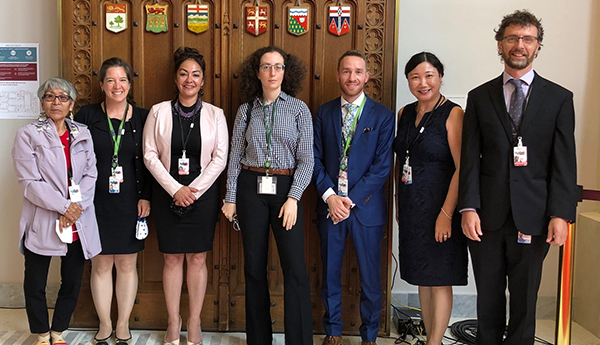Interpretation in Indigenous languages, past to present
Offered for the first time on January 15, 1959, simultaneous interpretation of parliamentary proceedings has long been limited to English and French. If a Member of Parliament or Senator wanted to speak in an Indigenous language, their statements were translated later in the written record of the meeting. In fact, simultaneous interpretation in Indigenous languages was not introduced in Parliament until some 50 years later, first in the Senate in 2008, then in the House of Commons in 2019.

In the 2016 Census, 228,765 people in Canada reported speaking an Indigenous language at home. An estimated 90 Indigenous languages and dialects are spoken in Canada. Offering simultaneous interpretation in all these languages is a significant challenge!
Within the Government of Canada, the Translation Bureau, Public Services and Procurement Canada, is responsible for providing this service. The Bureau provides translation, terminology and interpretation services to Parliament and government departments and agencies in English, French, foreign languages, sign language and Indigenous languages. In addition to parliamentary debates, simultaneous interpretation is offered at certain events such as international summits, discussions between heads of state, ministers or senior government officials, hearings before federal tribunals, and public information sessions.
Enhancing Indigenous language capacity
In support of various initiatives to promote Indigenous languages implemented over the last few years, including the passage of the Indigenous Languages Act, the Translation Bureau has made efforts to better meet the demand. Among other things, we have assessed parliamentarians’ and departments’ Indigenous languages needs.
In this regard, the Translation Bureau works with private sector suppliers to offer its services in Indigenous languages. While it is sometimes difficult to find interpreters and translators in some languages, the Bureau has contacted and collaborated with Indigenous communities, educational institutions and other stakeholders across Canada to recruit new providers. To ensure they are well-equipped, it offered workshops to familiarize them with simultaneous interpretation in a government context. As a result of these outreach activities, the Translation Bureau now has a roster of over 100 service providers, enabling it to offer translation and interpretation services in more than 50 of the approximately 90 different Indigenous languages and dialects.
A successful challenge
This is how the Translation Bureau has helped the Government and Parliament achieve several historic milestones in recent years for the promotion of Indigenous languages:
- on January 28, 2019, the Bureau provided simultaneous interpretation of an Indigenous language (Plains Cree) in the House of Commons for the first time
- in October 2019, the Bureau provided the first-ever simultaneous interpretation of the federal leaders’ debates in Indigenous languages (Plains Cree, Inuktitut, Ojibway, East Cree and Denesuline), a feat it consolidated in September 2021 by adding Innu to the list of languages represented
- on July 26, 2021, the Bureau provided simultaneous interpretation into Inuktitut of the installation ceremony of the new Governor General, Mary Simon, herself a member of the Inuit community
“We are very proud to support efforts to promote Indigenous languages in Canada,” said Lucie Séguin, Chief Executive Officer of the Translation Bureau. “In collaboration with our Indigenous partners, we are making essential information from Parliament and the Government of Canada more accessible to First Nations, Inuit and Métis peoples in Canada.”
Consult the Indigenous language resources available on the Language Portal of Canada and visit the Translation Bureau to learn more about the linguistic services it provides to Parliament and government departments and agencies.